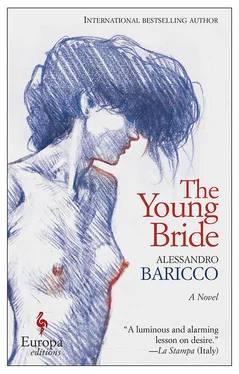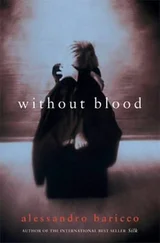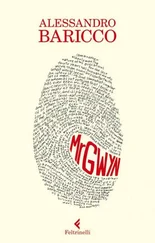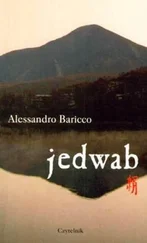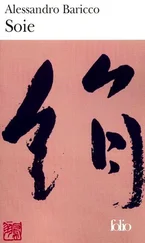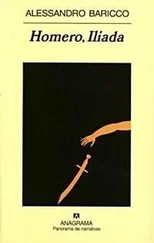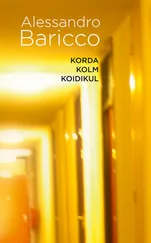The Uncle didn’t move, but the rhythms of his presence were mysterious, and the Father waited, in no hurry. He didn’t add anything to what he had said, except, as a footnote, a long patient silence. Until one of the Uncle’s hands moved toward a pocket and took out some matches. He opened his eyes, apparently unaware of the Father, and lit the cigarette. Only then did he turn toward him.
All those things he sends, he said.
With a gesture he waved off the smoke, which seemed to be blowing toward the Father.
He’s getting rid of them, he said.
He didn’t bring the cigarette to his lips, but let it smoke on its own, as if lighting it had been a courtesy toward the thing itself.
I didn’t understand it. Did someone understand it? he asked.
The Father said that it had seemed to him an odd way of returning, maybe even a good way: a little at a time. It seemed a happy way of returning.
Instead, he was leaving, he said.
The Uncle looked at the cigarette, gave it a few more seconds, then put it out in a vase of flowers that had long been accustomed to such usage.
Right, he said.
Then he closed his eyes. Sleeping, he added that no one disappears to die, but some do it to kill.
Of course, the Mother had opined, cheerfully, it’s obvious that the girl has to see the city, otherwise how will she ever be able to understand a Gothic cathedral or the bend of a river. There were in the city neither Gothic cathedrals nor bends in a river, but it occurred to no one to point this out to her (many of her syllogisms were in fact inscrutable). It was the middle of breakfast, the toast was starting to cool, and the Father and the young Bride were in their rooms getting ready. Only I don’t understand why by train, the Mother continued. When we have a car, I mean. The Pharmacist, a noted hypochondriac, and hence unusually suited to his job, started off on a reflection on the risks of travel, however one intended to do it. With a certain pride, he emphasized that he had never exceeded a distance of thirty-five kilometers from his house. It takes a certain resolve, the Mother admitted. It’s one of my virtues, said the Pharmacist. And a surprising dose of stupidity, the Mother concluded. The Pharmacist made a slight bow and murmured Thank you, because he had been drinking and only later, that night, at home, reconstructed the entire sequence, grasping that something had escaped him. He hadn’t slept, because of it. His wife, a harridan ten years older than he, whose breath was famous throughout the entire region, had asked if there was something bothering him. Apart from you? the Pharmacist had asked; as a youth, he had had his moments of brilliance.
So they found themselves on the train. Modesto had done his work well, and an entire car was given over to their solitude, while in the others, people were packed in amid luggage and the cries of children. It’s incredible what can be obtained with a lot of money and a particular talent for courtesy.
The Father was facing backward, and this was due to the imprecision in his heart and a scrupulous, as well as idiotic, recommendation of his cardiologist, Dr. Acerbi. The young Bride was dressed with chaste elegance, because she had decided on a fairly low profile. In fact the Mother, seeing her leave, had turned up her nose. Is she going to visit the sisters? she had asked her neighbor, without noticing that it was Monsignor Pasini. But she didn’t bother choosing her interlocutor when it came to speaking. Probably she thought she was speaking to the world when she spoke. It’s a common mistake. It’s possible, Monsignor Pasini had answered politely. Years earlier he had fallen for a Carmelite sister, but at the moment the fact didn’t occur to him.
When the train left — on the advice of the aforementioned Dr. Acerbi, they had arrived an hour early, so as to avoid any possibility of stress — the Father thought he ought to start the job that, with a certain ferocity, he had decided to tackle that day.
You must have wondered why I’m bringing you with me, he said.
No, said the young Bride.
And for a while the conversation struggled to take off.
But the Father had a mission to complete, studied down to the millimeter, so he waited for the plan to come together again clearly in his mind, opened the briefcase that he always carried with him to the city (often it contained nothing, he liked to have something not to forget on his rounds), and took out a letter. It had been opened and was covered with stamps.
I received this, a few days ago, from Argentina. I’m afraid you must read it, signorina.
The young Bride glanced at the envelope, but as she might have looked at a plate of asparagus after vomiting.
Would you prefer that I summarize it? the Father asked.
I would prefer that you put it back in the briefcase, if I really have to tell the truth.
That is impossible, said the Father. Or rather: pointless, he clarified.
Then I would prefer a summary.
All right.
The train rattled.
News has reached me from your family, he began. It’s not good, he clarified.
Then, since the young Bride didn’t react, he decided to push on into the heart of the matter.
You see, I am afraid I have to inform you that, the day after you left Argentina, your father was found in a ditch, drowned in a foot of mud and water.
The young Bride didn’t move a muscle. The Father continued.
He was returning from an evening I don’t know where, probably he was drunk, or I’d rather think that his horse shied and threw him to the ground. Probably a fatal accident, a piece of bad luck.
It’s not a ditch, said the young Bride. It’s a river, a wretched river, the only one in that area.
The Father had in mind a different type of reaction, and for that he had been prepared. The letter fell from his hand and he had to lean over to pick it up.
Not a piece of bad luck, continued the young Bride. He promised to do it and he did. He must have gotten drunk as a brute and then jumped.
Her voice was very hard, and calm. But the Father saw tears in her eyes.
Do you know anything else? the young Bride asked.
He left a peculiar will, written the very day of his death, the Father said cautiously.
The young Bride nodded.
The train rattled.
He left half his possessions to his wife, and the other half to his children.
All his children?
There, that’s the point, if you like.
I’d like.
I have to inform you that you are not mentioned, signorina.
Thank you for your care, but I would prefer to avoid euphemisms; I know what I can expect.
Let’s say that you are mentioned, but in a context that’s rather… I would say harsh .
Harsh.
There’s only one sentence devoted to you.
A sentence that says?
Apparently your father wished you to be cursed, for all the days that you have still to live. I quote from memory, and I apologize profoundly.
The tears began to drip down her face, but she sat with her back straight and her eyes fixed on the Father.
Is there more? she asked.
That’s all, said the Father.
How do you know all these things?
I keep myself informed, any businessman does.
Business with Argentina?
It happens.
The young Bride didn’t even try to hide her tears, or dry them in any way. And yet in her voice there was no hint of grief, or surprise.
Would you mind if we were silent for a while? she said.
Of course, I understand very well.
A lot of countryside went by, through the windows, unchanging, while the young Bride sat in a steely silence, and the Father stared into the emptiness, reviewing his thoughts. They passed through small stations with poignant names, fields of grain ripening in the heat, farmhouses without poetry, silent bell towers, roofs, stables, bicycles, indifferent humans, curves in the road, rows of plants, and once a circus. Only when the city was looming did the young Bride take out a handkerchief, dry her tears, and look up at the Father.
Читать дальше
